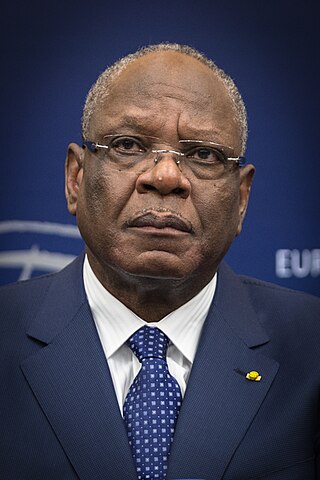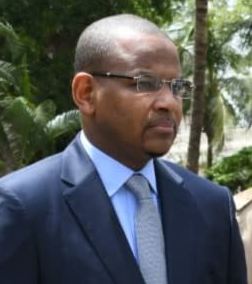
Until the military coup of March 22, 2012 and a second military coup in December 2012 the politics of Mali took place in a framework of a semi-presidential representative democratic republic, whereby the President of Mali is head of state with a Presidentially appointed Prime Minister as the head of government, and of a multi-party system.

Mali elects on the national level a head of state – the president – and a legislature. The president is elected for a five-year term by the people. The National Assembly has 160 members, elected for a five-year term, 147 members elected in single-seat constituencies and 13 members elected by Malians living abroad.

Ibrahim Boubacar Keïta, often known by his initials IBK, was a Malian politician who served as the president of Mali from September 2013 to August 2020, when he was forced to resign in the 2020 Malian coup d'état. He served as Mali's prime minister from February 1994 to February 2000 and as president of the National Assembly of Mali from September 2002 to September 2007.

Soumaïla Cissé was a Malian politician who served in the government of Mali as Minister of Finance from 1993 to 2000.

The Rally for Mali is a Malian political party created by Ibrahim Boubacar Keïta in June 2001. In 2013, Keita was elected President of Mali following several unsuccessful attempts, and the party took first place in parliamentary elections, winning 66 seats, although not enough for a majority.

The Alliance for Democracy in Mali – African Party for Solidarity and Justice is a political party in Mali.

The Union for the Republic and Democracy is a political party in Mali, led by Soumaïla Cissé.

Parliamentary elections were held in Mali on 1 July 2007, with a second round on 22 July. In the first round, there were about 1,400 candidates for 147 seats in the National Assembly.

Parliamentary elections were held in Mali on 24 November 2013. President Ibrahim Boubacar Keïta's party, Rally for Mali, won 66 of the 147 seats in the National Assembly, with its allies winning an additional 49 seats, giving it a substantial majority. The Union for the Republic and Democracy, led by Soumaïla Cissé, won 17 seats, becoming the Opposition.

Presidential elections were held in Mali on 28 July 2013, with a second round run-off held on 11 August. Ibrahim Boubacar Keïta defeated Soumaïla Cissé in the run-off to become the new President of Mali.
Dramane Dembélé is a Malian politician who served in the government of Mali as Minister of Urban Planning and Housing from 2015 to 2016. A mining engineer by profession, he was Director-General of Geology and Mines from 2005 to 2010. He was the candidate of the Alliance for Democracy in Mali (Adéma-PASJ) for the July 2013 presidential election.

Presidential elections were held in Mali on 29 July 2018. In July 2018, the Constitutional Court approved the nomination of a total of 24 candidates in the election. As no candidate received more than 50% of the vote in the first round, a runoff was held on 12 August 2018 between the top two candidates, incumbent President Ibrahim Boubacar Keïta of the Rally for Mali and Soumaïla Cissé of the Union for the Republic and Democracy. Keïta was subsequently re-elected with 67% of the vote. It was the first time in Malian history that a presidential election was forced into a runoff between incumbent and a challenger.

Boubou Cissé is a Malian politician who was the Prime Minister of Mali from April 2019 to his resignation following the 2020 Malian coup d'état in August 2020. He was also the Minister of Economy and Finance and Minister of Mines and Industry.
Moussa Timbiné is a Malian politician representing Rally for Mali. He became President of the National Assembly of Mali on 11 May 2020 but was deposed on 18 August 2020 during the 2020 Malian coup d'état. He had been a member of the National Assembly since 2013.
Protests in Mali began on 5 June 2020 when protesters gathered in the streets of Bamako, calling for Ibrahim Boubacar Keïta to resign as president of Mali. The protests ended after a coup d'état on 18 August 2020. Both the president and prime minister of Mali were detained that afternoon, and in the evening they announced their resignations.
Gouagnon Coulibaly is a member of the National Assembly of Mali, representing Kati, and a member of the Union for the Republic and Democracy (URD) political party. In 2022, he was elected president of the URD but was accused of electoral fraud, leading to several months of conflict with opponent Salikou Sanogo. Coulibaly officially took office in April 2023 after the Supreme Court affirmed his presidency.

On 18 August 2020, elements of the Malian Armed Forces began a mutiny, and subsequently undertook a coup d'état. Soldiers on pick-up trucks stormed the Soundiata military base in the town of Kati, where gunfire was exchanged before weapons were distributed from the armory and senior officers arrested. Tanks and armoured vehicles were seen on the town's streets, as well as military trucks heading for the capital, Bamako. The soldiers detained several government officials including President Ibrahim Boubacar Keïta, who resigned and dissolved the government. This was the country's second coup in less than 10 years, following the 2012 coup d'état.
Mahmoud Dicko is a Malian Salafi imam from the Tombouctou Region who chaired the High Islamic Council of Mali from January 2008 to April 2019.
The 2021 Malian coup d'état began on the night of 24 May 2021 when the Malian Army led by Vice President Assimi Goïta captured President Bah N'daw, Prime Minister Moctar Ouane and Minister of Defence Souleymane Doucouré. Assimi Goïta, the head of the junta that led the 2020 Malian coup d'état, announced that N'daw and Ouane were stripped of their powers and that new elections would be held in 2022. It is the country's third coup d'état in ten years, following the 2012 and 2020 military takeovers, with the latter having happened only nine months earlier.











